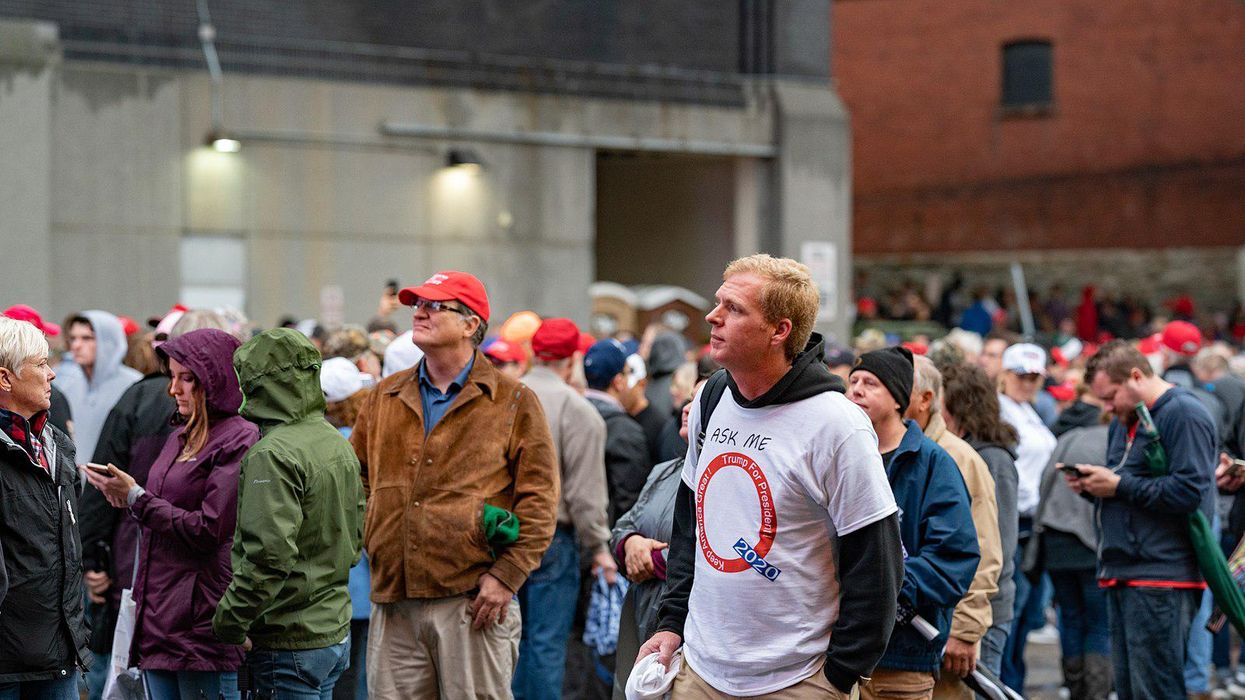Poll: Nearly Half Of QAnon Followers Believe In Global Jewish Conspiracy
Reprinted with permission from American Independent
At the dawn of the 20th century, a booklet based on anti-Semitic lies about a shadowy plot by Jews to control the world that was originally published in Russia in 1905 and subsequently translated into other languages, began spreading throughout Europe and to other countries.
A century later, the ideas captured in "The Protocols of the Elders of Zion" still have their adherents. A Morning Consult poll conducted April 27-29 and published on June 28 finds that nearly half of believers in the QAnon conspiracy theory also believe in the purported plot by Jews for world domination.
Experts say the overlap is not all that shocking.
"People with conspiratorial worldviews believe conspiracy theories. … To them, events and circumstances are often the outcomes of shadowy conspiracies," Joseph Uscinski, an associate professor of political science at the University of Miami and the co-author of American Conspiracy Theories, told The American Independent Foundation. "So they're not just going to believe one conspiracy theory, they're going to believe a whole bunch."
Of Americans who believe in the Protocols, almost 80 percent believe in QAnon too, according to the poll.
QAnon centers on the belief that a group of celebrity Satan-worshipping pedophiles runs the world through a "deep state" government. Facebook, YouTube, and Twitter began cracking down and banning QAnon accounts last year, while the FBI warned lawmakers earlier this month that QAnon conspiracy theorists may mount more acts of violence.
Vegas Tenold, a researcher with the Anti-Defamation League, told Business Insider last fall that "there are several tropes that really sort of smack of anti-Semitism" in QAnon. "You're going to find very few global conspiracy [theories] that don't touch on anti-Semitic tropes." Genocide studies scholar Gregory Stanton called QAnon a "recast version" of the Protocols, replacing a cabal of nefarious Jews with a new group of shadowy elites.
On January 6, QAnon believers and anti-Semites found a common stage to air their fringe beliefs. One of the most striking images to emerge from the riot by supporters of President Donald Trump at the Capitol was that of a man wearing a sweatshirt emblazoned with the words "Camp Auschwitz," a reference to the Nazi concentration camp where almost a million Jews were murdered during the Holocaust.
Trump gave cover to both groups to emerge from the fringes of mainstream thought and profess their views proudly, Magda Teter, professor of history at Fordham University and the author of Blood Libel: On the Trail of an Anti-Semitic Myth, told The American Independent Foundation.
"You have a gradual amplification of voices that had been, just a few years ago, fairly marginalized and deep web [and] hidden — you really had to dig in if you were interested in the far-right antisemitic fringe groups," Teter said. "This changed since really Trump became the political figure that he became in 2015, starting to run for president, giving voice and weight to some of those people and those voices."
According to a report published by the Anti-Defamation League in 2020, 2019 was the worst year for anti-Semitic attacks since it started tracking anti-Jewish hate 40 years ago. And many of those attacks are inspired by anti-Semitic ideas peddled by conspiracy theorists on the internet.
In 2018, Rep. Marjorie Taylor Greene (R-GA), one of QAnon's most prominent adherents, claimed that the Jewish Rothschild family was responsible for starting California's worst wildfire in history with a space laser.
While Democratic House members voted to strip Greene of her committee assignments after that and other remarks, her Republican colleagues stood by her.
Currently, 15 percent of Americans agree that government, media, and financial systems are controlled by Satan-worshipping pedophiles running a global child sex trafficking ring, according to a May poll conducted by the Public Religion Research Institute and Interfaith Youth Core.
"The beliefs and theories that were totally fringe and unacceptable now are espoused by members of Congress, to no really serious consequence," said Fordham's Teter.
Published with permission of The American Independent Foundation.









